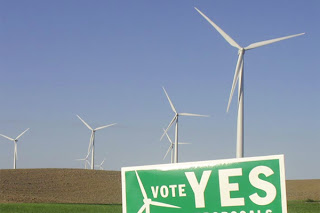
An independent report on wind farms produced for MPs has concluded that the downsides of wind farms are often exaggerated by their opponents, who have recently stepped up their lobbying of parliamentarians.
The new policy brief on ‘The case for and against onshore wind energy in the UK’ is being distributed this week to every UK Member of Parliament and will be launched at the House of Commons on 13 June. It comes from the Grantham Research Institute on Climate Change and the Environment, which is chaired by Lord Nicholas Stern, author of the 2006 Stern Review, and located at the London School of Economics.
It finds that wind turbines are not too unreliable or expensive to contribute significantly to Britain's electricity generation mix, and that it is wrong to think that gas is a useful relatively low carbon fuel.
Last week, George Osborne indicated he would like to see the subsidy for onshore wind cut by 25%, and David Cameron sealed a deal with Norway that favours the use of gas in the UK electricity generation mix. DECC’s proposals for electricity market reform also would, if implemented, lock the UK into heavy reliance on gas-powered generation until 2045. None of this is good news in the struggle against climate change.
"It is not a choice between onshore wind and fossil fuels," the LSE report concludes, however. "Once the implications of the UK’s carbon targets are recognised, the issue of onshore wind becomes a choice between this and other low-carbon energy sources. A second robust lesson is that many low-carbon technology combinations are technically feasible."
The Grantham Institute's Bob Ward, speaking to EAEM on behalf of its authors, Samuela Bassi, Alex Bowen and Sam Fankhauser, said that they looked at the claims most frequently used by anti-windfarm lobbyists. “When these claims are scrutinised", he said, "they do not stand up to analysis".
There are three myths commonly repeated in anti-windfarm rhetoric:
Myth 1: that there is a requirement for gas-powered backup to counter the unreliability of wind power. “This is plainly untrue," said Bob Ward. “Only 1% of carbon savings are wiped out, because there are many ways of managing both demand and supply due to the intermittency of the wind." The report says: "The cost penalty and grid system challenges of intermittency are often exaggerated. There are several other ways of compensating for the variability, such as bulk storage of electricity, greater interconnection, and a more diversified mix of renewable sources, as well as measures to manage demand, like smart grids and improved load management.”
Myth 2: that onshore wind is expensive. “We found that it is the cheapest of all low carbon forms of electricity generation," said Bob Ward. The report says: “A key attraction of onshore wind over other low-carbon forms of electricity generation is cost. In terms of levelised cost – an economic measure which takes into account all of the costs of a technology over its lifetime – onshore wind is currently the cheapest renewable technology in the UK. The choice between more affordable electricity (which would favour onshore wind) and local environmental protection (which may favour other low-carbon technologies) is ultimately a political one."
Myth 3: that using gas power generation is low carbon and will help us meet our climate commitments. “This is only true if we stop using gas in 2020," said Bob Ward, because at that point emissions need to drop further than relying on gas can permit. The report concludes: "It is clear that the further decarbonisation required in the 2020s cannot be achieved by heavily relaying on unabated gas power stations. Rational policy-makers need to anticipate this and avoid locking in high-carbon electricity generation.”
“The thing is," continued Bob Ward, “those who have an agenda against wind farms then seek to find proof to back it up. They twist the evidence to make it fit."
He says he finds the same misinformation cropping up again and again in anti-windfarm rhetoric. It gains credence by being repeated so often, for instance by the Global Warming Policy Foundation, the new Welsh group No To Wind and in the letters written by a hundred Tory MPs recently to George Osborne.
“Concerns about the local visual and environmental impact wind farms are legitimate," continued Mr. Ward, “and they shouldn't be situated anywhere. That is why Tim Yeo was correct to point out last weekend that we should be copying Denmark and Germany and letting communities receive the benefits to which they are entitled of having a wind farm nearby".
The report therefore recommends a number of regulatory measures “that can help to encourage onshore wind developments where they make sense and prevent them from happening where they do not.” These are:
- A clear price for carbon that favours the relative merit of wind and other low-carbon forms of power production compared to hydrocarbon-based fuels
- A planning system that reduces the costs and uncertainties to project developers, factors in local environmental concerns and prevents developments in important environmental areas, and ensures appropriate benefit-sharing in the local community
- measures to ensure that the electricity system can cope with intermittent resources.
The latter include: smart transmission and distribution systems, interconnection to other energy markets, energy storage, load management and flexible demand measures, as well as appropriate combination of fossil fuel (ultimately linked with carbon capture and storage) and renewable sources to ensure balancing and the ability to meet peak demand.
Greater support for research and development into new forms of energy storage was recently called for by the Institution of Mechanical Engineers.
And a new, promising form of storage specifically aimed at windfarms recently received $15 million of backing from Bill Gates, Khosla Ventures and energy company Total. The Liquid Metal Battery uses common raw materials and is the brainchild of MIT's Donald Sadoway.
No comments:
Post a Comment